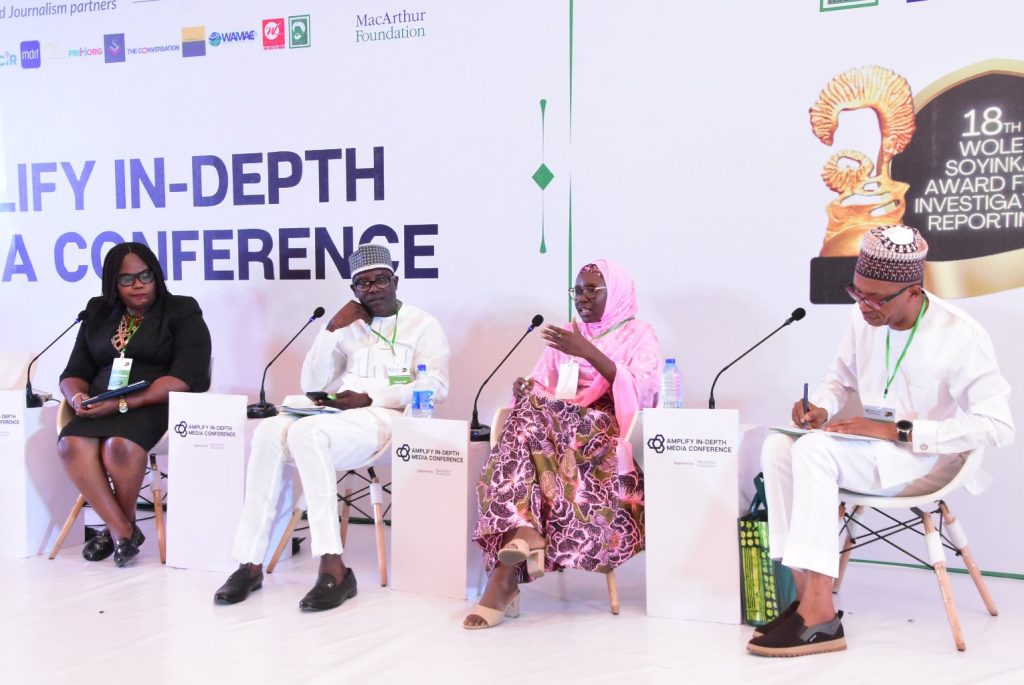Arinze Chijioke
The need for media outlets in Nigeria to adopt innovative techniques that will ensure that they are sustainable to be able to undertake their responsibility of entrenching democracy and the advent of Artificial Intelligence and how it continues to impact the practice of journalism took center stage when media entrepreneurs, investigative journalists and communication scholars met in Abuja for the 2023 annual Amplify In-depth Media Conference.
Organised by the Wole Soyinka Centre for Investigative Journalism (WSCIJ), in collaboration with over 18 media outlets, the conference, which took place on Friday 8 and Saturday 9 December 2023, at Abuja Continental Hotel (former Sheraton) in Abuja had over 40 speakers examine the broad theme ‘The independent media equation: Policies, ownership, technology and sustainability.’
It was supported by the MacArthur Foundation.
In his keynoted address, Publisher of Premium Times and veteran investigative journalist, Dapo Olorunyomi said that shifts in ownership sustainability quotient and policies have always affected the status of journalism and invariably its independence.
Olorunyomi, who doubles as the Founder/CEO of the Centre for Journalism Innovation and Development (CJID) also spoke about the fact that the digitisation of information, coupled with innovative, easily accessible distribution channels invariably set out to undermine the credibility and integrity of journalism.
“We have thus arrived at a curious historical point in history where we are trying to execute the important project of journalism in an age of artificial intelligence and of democracy building,” he said.
He noted that AI has been around for a while, what is new, and challenging is its generative phase that has lately grown some astonishing capabilities to operate and spawn language in words, sounds and images.
“This is partly where journalists should be concerned and not merely for the existential reason that their job is lost but because in a “political battle for minds and hearts, intimacy is the most efficient weapon, and AI has just gained the ability to mass-produce intimate relationships with millions of people,” he said.
He however noted that for journalism to overcome its own internal challenge of sustainability and rise to the level of effectiveness to play its true democratic roles it must embrace innovations of its processes, skill sets, and behavioral resources.
The conference also featured panel discussions, experience-sharing, and workshops sessions that explored critical sub-topics on policies, technology and artificial intelligence, sustainability, ethics in journalism, business models, and the sustained amplification and impact of investigative journalism beyond awards and donor interventions.
In their separate reactions to the keynote address, Deji Adekunle, Programme Director, MDIF/Nigeria Media Innovation Program (NAMIP), and Naziru Abubakar of Daily Trust said that pursuit of sustainable strategies does not, in any way, impact the primary role of journalism which has to do with holding governments to account, rather, it helps media house stay afloat and be independent of external influence.
On the conversation on Innovative tools and strategies for independent journalism in the digital age, Editor at TheCable, Kolapo Olapoju said that the attention span of young people particularly gets shorter by the day, so also is their preference for news consumption.
“They are evolving with the trends and that is why at the Cable, we have been trying to meet their needs by introducing a podcast for instance, which allows you to listen to the news from anywhere. With that, you don’t have to read a 2000 word article.”
Executive Producer at TRT World, Princess Irede said that It is always important for newsrooms to try out/experiment new tools when they come out rather than dismiss them. She however noted that It was also important to discuss digital security and ethical considerations in the use of new technologies.
“We should never ever shy away from these tools. But we must also maintain our journalistic integrity,” she said.
Earlier in a welcome address, Executive Director of the WSCIJ, Motunrayo Alaka, said that the theme of the conference would not have come at a better time than now when the media is under real-time pressure to pursue sustainable strategies.
The financial viability of journalism is not optional, it is existential. The media must adopt innovative techniques and explore frameworks that allow it to thrive,” she said.
She also said that the media also needs to rise to the task of handling the delicate balance of deploying technology while also interrogating its intrusive nature and capacity to enable misinformation and disinformation which erode the credibility of the media at an unimaginable scale.
Also, Deputy Director, (Ag.) MacArthur Foundation, Amina Salihu, said that quality reporting and editorial independence are not negotiable if the media must function optimally and inspire citizens to push for change.
She noted that it is for the health and well-being of journalists and the safety of the space in which they work that the foundation continues to provide support for media outlets in the country who are doing critical reporting.
Among the long list of speakers were Umaru Pate, Vice Chancellor, Federal University of Kashere (FUK), Gombe State; Amina Salihu, Deputy Director, MacArthur Foundation; Yemisi Bamgbose, Executive Secretary of Broadcasting Organisations of Nigeria (BON); Toyin Akinniyi, Vice President, Africa, Luminate Group; Franca Aiyetan, Spokesperson, National Broadcasting Commission.

